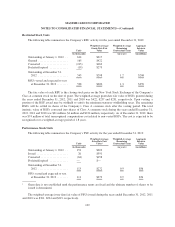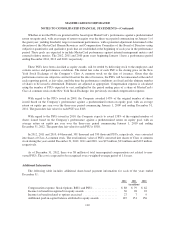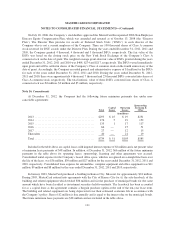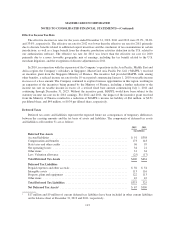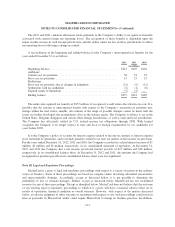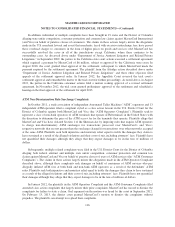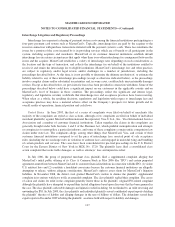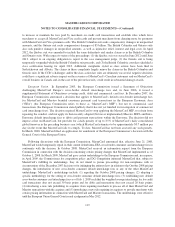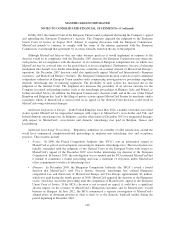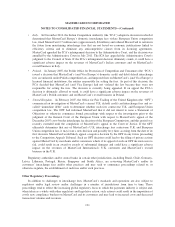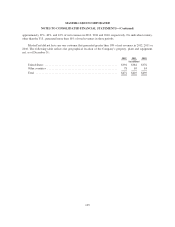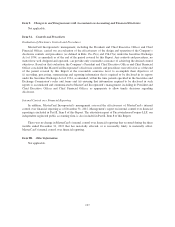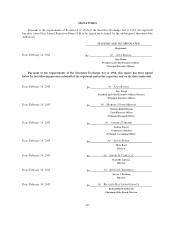MasterCard 2012 Annual Report Download - page 123
Download and view the complete annual report
Please find page 123 of the 2012 MasterCard annual report below. You can navigate through the pages in the report by either clicking on the pages listed below, or by using the keyword search tool below to find specific information within the annual report.MASTERCARD INCORPORATED
NOTES TO CONSOLIDATED FINANCIAL STATEMENTS—(Continued)
to increase or maintain the fees paid by merchants on credit card transactions and establish rules which force
merchants to accept all MasterCard and Visa credit cards and prevent merchants from charging more for payments
with MasterCard and Visa premium cards. The British Columbia suit seeks compensatory damages in unspecified
amounts, and the Ontario suit seeks compensatory damages of $5 billion. The British Columbia and Ontario suits
also seek punitive damages in unspecified amounts, as well as injunctive relief, interest and legal costs. In April
2012, the Quebec suit was amended to include the same defendants and similar claims as in the British Columbia
and Ontario suits. With respect to status of the proceedings: (1) the Quebec suit was stayed in June 2012 until June
2013, subject to an ongoing obligation to report to the case management judge, (2) the Ontario suit is being
temporarily suspended while the British Columbia suit proceeds, and (3) the British Columbia court has scheduled a
class certification hearing for April 2013. Additional complaints styled as class actions have been filed in
Saskatchewan and Alberta. The claims in these complaints largely mirror the claims in the British Columbia and
Ontario suits. If the CCB’s challenges and/or the class action law suits are ultimately successful, negative decisions
could have a significant adverse impact on the revenues of MasterCard’s Canadian customers and on MasterCard’s
overall business in Canada and, in the case of the private lawsuits, could result in substantial damage awards.
European Union. In September 2003, the European Commission issued a Statement of Objections
challenging MasterCard Europe’s cross-border default interchange fees and, in June 2006, it issued a
supplemental Statement of Objections covering credit, debit and commercial card fees. In December 2007, the
European Commission announced a decision that applies to MasterCard’s default cross-border interchange fees
for MasterCard and Maestro branded consumer payment card transactions in the European Economic Area
(“EEA”) (the European Commission refers to these as “MasterCard’s MIF”), but not to commercial card
transactions (the European Commission stated publicly that it has not yet finished its investigation of commercial
card interchange fees). The decision required MasterCard to stop applying the MasterCard MIF, to refrain from
repeating the conduct, and not apply its then recently adopted (but never implemented) Maestro SEPA and Intra-
Eurozone default interchange fees to debit card payment transactions within the Eurozone. The decision did not
impose a fine on MasterCard, but provides for a daily penalty of up to 3.5% of MasterCard’s daily consolidated
global turnover in the preceding business year (which MasterCard estimates to be approximately $0.7 million per
day) in the event that MasterCard fails to comply. To date, MasterCard has not been assessed any such penalty.
In March 2008, MasterCard filed an application for annulment of the European Commission’s decision with the
General Court of the European Union.
Following discussions with the European Commission, MasterCard announced that, effective June 21, 2008,
MasterCard would temporarily repeal its then current default intra-EEA cross-border consumer card interchange fees in
conformity with the decision. In October 2008, MasterCard received an information request from the European
Commission in connection with the decision concerning certain pricing changes that MasterCard implemented as of
October 1, 2008. In March 2009, MasterCard gave certain undertakings to the European Commission and, in response,
in April 2009, the Commissioner for competition policy and DG Competition informed MasterCard that, subject to
MasterCard’s fulfilling its undertakings, they do not intend to pursue proceedings for non-compliance with or
circumvention of the December 2007 decision or for infringing the antitrust laws in relation to the October 2008 pricing
changes, the introduction of new cross-border consumer default interchange fees or any of the other MasterCard
undertakings. MasterCard’s undertakings include: (1) repealing the October 2008 pricing changes; (2) adopting a
specific methodology for the setting of cross-border consumer default interchange fees; (3) establishing new default
cross-border consumer card interchange fees as of July 1, 2009 such that the weighted average interchange fee for credit
card transactions does not exceed 30 basis points and for debit card transactions does not exceed 20 basis points;
(4) introducing a new rule prohibiting its acquirers from requiring merchants to process all of their MasterCard and
Maestro transactions with the acquirer; and (5) introducing a new rule requiring its acquirers to provide merchants with
certain pricing information in connection with MasterCard and Maestro transactions. The undertakings were effective
until the European Union General Court issued a judgment in May 2012.
119


